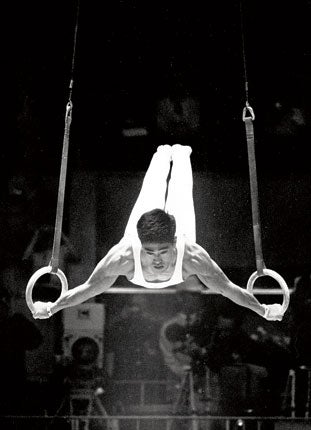Yukio Endo: Gymnast who won five gold medals at the Olympic Games

Yukio Endo was one of Japan's most successful and celebrated gymnasts. He was a member of the all-conquering gymnastics teams that dominated the 1960s, winning Olympic team titles in 1960, 1964 and 1968, and world team titles in 1962 and 1966.
At the 1964 Tokyo Olympics, Endo won his country's first gold medal for the individual all-around and also won gold on the parallel bars competition, with silver on the floor exercises for good measure. He went on to have a gymnastic element on the high bar named after him – the "Endo roll" – and he became Japan's most accomplished and revered gymnast.
Yukio Endo was born in Akita Prefecture in the north-west of Japan on 18 January 1937. His family ran a pharmacy. Following the death of his mother from tuberculosis when he was nine years of age, the young Endo grew up in a state orphanage. He recalled that his interest in gymnastics was sparked by a teacher who encouraged him to get involved in sport rather than "just lying in bed".
Japan was banned from the 1948 Olympic Games and went to the 1952 Helsinki Olympics as an unknown quantity in gymnastics, but finished fifth overall and fifth in the team competition, in which Takashi Ono, from the same prefecture as Endo, participated. Japan was encouraged by this result and set about challenging, and ultimately breaking, the Soviet Bloc countries' domination of the sport.
In the 1956 Olympics, in Melbourne, success came when the Japanese gymnastics team nearly tripled their medal count and finished third overall in the gymnastics table behind the Soviet Union and Hungary. Japan's star performer was Takashi Ono, who won his country's first gymnastics Olympic gold medal on the high bar. He inspired Endo, who trained intensely at Akita Technical High School before entering the Tokyo University of Education (now the University of Tsukuba), from which he graduated in 1959.
While at university, Endo was coached by Akitomo Kaneko and participated in various university-level gymnastic competitions, finishing fifth in the individual all-around discipline. In 1960, while an assistant instructor of physical education at Nihon University, he was selected to be a member of the Japanese national team for the 1960 Rome Olympics, where he made his international debut.
In Rome, Endo joined his idol and mentor as a member of the team that earned Japan's first team Olympic gold medal in gymnastics. In addition, they won three further gold medals, which placed them second overall in gymnastics behind the Soviet Union. Endo tied with his team-mate Masao Takemoto for fifth place in the all-around event, and was fifth on the vault and fourth on the high bar.
Following his first Olympics and the team's Olympic success, Endo, who had just been "very happy to be able to fly abroad in an airplane", went from strength to strength. At the 1962 World Championships in Prague, Japan again won the team gold with Endo taking six individual medals. He won another gold on the floor exercise, silver medals in the all-around, still rings and high bar, and bronze medals on vault and parallel bars. He was now regarded as Japan's top gymnast.
With the 1964 Olympics taking place in Tokyo, the team was under enormous pressure to succeed. They did not disappoint. Japan successfully defended the team title and Endo, aged 27 and in his prime, won gold medals in the all-around event and parallel bars as well as silver in the floor exercises. This enabled Japan to knock the Soviets off top spot and break their domination in the gymnasium for the first time. The all-conquering team, and Endo in particular, became national heroes.
Endo followed up his Olympic achievements with three more medals at the 1966 World Championships in Dortmund; gold with the team and silvers on the floor exercise and high bar.
The 1968 Mexico Olympics saw Endo, now aged 31, honoured as the nation's flag bearer. As team captain, he led Japan to another team gold, in addition to individual silver in the long horse vault. Japan also maintained their position as the leading gymnastic nation ahead of the Eastern Bloc countries.
Shortly after the Games Endo retired and became a coach and trainer for aspiring athletes while teaching at Tokyo's Nihon University. He was later appointed as a professor there. In 1972, as team manager, he led Japan's competitors to the Munich Olympics. Over the years he was also a director of the Japanese Olympic Committee and twice vice-president of the Japan Gymnastic Association. In 1996 he received Japan's highest honour, the Emperor's Medal, and in 1999 he received the ultimate accolade when he was inducted into the International Gymnastics Hall of Fame. However, he once commented that his most prized keepsake was the "private trophy" that was given to him for winning Japan's first individual all-round gold medal by Takashi Ono.
Overall, Endo won a total of 17 career medals: seven Olympic medals (five gold and two silver) and three gold, five silver and two bronze medals in the World Championships.
Yukio Endo, born Akita, Japan 18 January 1937; married (one son); died Tokyo 25 March 2009.
Join our commenting forum
Join thought-provoking conversations, follow other Independent readers and see their replies
Comments
Bookmark popover
Removed from bookmarks